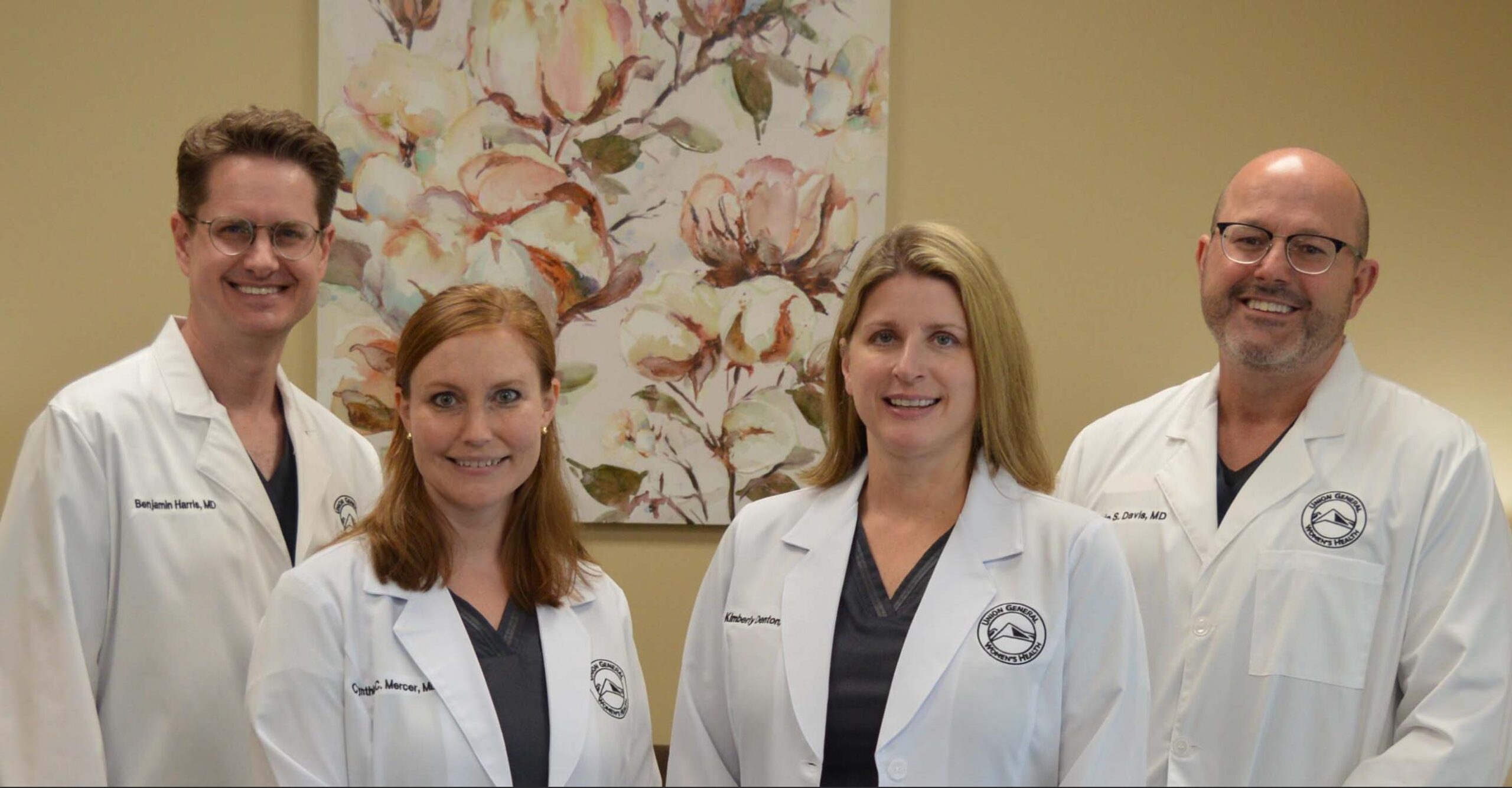
Union General Women’s Health is dedicated to providing obstetrics and gynecological services close to home! Serving all of Northeast Georgia, Western Carolina, and the surrounding areas. Every aspect of our office is designed to enhance our patients’ comfort. Scheduling and workflow are continually monitored, and no expense is spared to provide the most up-to-date and technologically advanced equipment.
Our experienced providers offer comprehensive services from annual exams to the most advanced surgeries. And we do it conveniently. We believe that a medical appointment should not take half of your day. We understand that your time is just as important as our time.
Our professional and courteous office staff is dedicated to each of our patients. They are ready to answer any questions or concerns you may have and to make your visit with us as convenient and comfortable as possible. With that in mind, it is important to us that you reach a member of our staff, as opposed to an automated answering service. At Union General Women’s Health, you are seen as a person, not a chart. Though you may have to leave a message or call back later due to occasional high call volumes, you can be sure a member of our office staff will get back to you as soon as possible.
Now offering Milex Cube Pessary! Check out this video for more information – https://goo.gl/46X73U
Patient Documents
What To Expect
First and foremost, we are here for the sole reason of providing the most comprehensive and preventative care to our patients. As you step into our office, you will quickly notice that our focus is your comfort. While your initial contact with us may be through our website, be assured that if you decide to contact us by phone you will always be greeted by a friendly office staff member as opposed to an automated list of menu options.
When you arrive for your appointment, you will be asked to provide a medical history or update your information. This can also be accomplished safely and securely in the convenience of your home by visiting the DigiChart Patient Portal. You will need a username and password provided by our office to login to the portal. Alternatively, your information can be input with a tablet computer while visiting our office. If you are not familiar with this type of technology, one of our friendly staff members can help you.
We are a paperless office. This means our patient records are stored and maintained electronically on a remote secure server which we access with handheld and/or desktop computers. The privacy and security of your personal and medical information is of the utmost importance to us. With this reliable system of record keeping, issues of privacy and security of patient information that often plague medical offices have been eliminated. Additionally, our office is able to run at peak efficiency, wait times are greatly reduced and we never misplace a chart.
Services
At Union General Women’s Health, our services run the gamut of women’s health issues. We are a full service obstetrics and gynecology practice where womens’ health comes first. Our expertise and experience in women’s health allows us to diagnose and treat a variety of conditions, as well as offer preventive care to keep you well. From comprehensive annual exams to today’s most advanced surgeries, you can trust Union General Women’s Health to both get you, and keep you, on the path of wellness.
Below is a list of some of the services offered by our professional healthcare providers.
Routine and High Risk Obstetrics
Infertility Treatment
Advanced Gynecologic Surgery
Menopause Care
Annual Exams
Urinary Incontinence Treatment
Laparoscopic Hysterectomy
3D/4D Ultrasound
Her Option® In-office Edometrial Ablation
Essure® In-office Sterilization Procedure
ParaGard® Intrauterine Copper Contraceptive
Mirena® Intrauterine Contraceptive System
Nexplanon® Contraceptive Implant
The list above is by no means comprehensive. Suffice it to say that if you’re a woman and are experiencing any health issues or concerns, please contact our office at (706) 835-2222, to set up an appointment.
Expecting?
Your pregnancy will be based on a forty-week gestation. Early in your pregnancy, an estimated date of delivery will be calculated for you. Your ultrasound may result in a new estimated due date. We must emphasize that this is an expected date of delivery. Unless a problem arises, your pregnancy may continue beyond this date. We are sympathetic to the discomfort most women experience, especially during the last weeks of pregnancy. Labor inductions must only be considered with great care, taking into account the well being of both the mother and her baby.
If problems or questions should arise during your pregnancy, please notify our office during regular business hours. Union General Women’s Health believes that having a recorded greeting is both impersonal and frustrating. We do our best to ensure that one of our caring and knowledgeable staff is always available to answer your call. However, you may briefly get a busy signal or be required to leave a voice mail during high volume call times. Please leave a message or call back as soon as you deem appropriate. The possibility of needing to speak with us can occur at any time. With that in mind, we suggest that you program our phone number into your cell phone. The policy at Union General Women’s Health is to offer same day appointments for any of our obstetric patients. For after-hour emergencies, Labor & Delivery nurses can be reached at Union General Hospital by calling 706.439.6439. This is another good number to add to your cell phone contacts. If necessary, hospital personnel will contact the on-call physician.
With serious medical complications of pregnancy, you may be directed to undergo a thorough evaluation in the hospital emergency department. You could also be seen in the emergency department for medical problems unrelated to your pregnancy or if your pregnancy is twenty weeks or less. For pregnancy-related problems after twenty weeks gestation, you will need to go to the obstetrics department where a nurse will evaluate you and the doctor will be informed. You can also call our office during business hours and we’ll get you in as soon as possible. Again, the policy at Union General Women’s Health is to offer same day appointments for any of our obstetric patients. It is of the utmost importance to us to prevent mild symptoms from progressing to major problems.
If during your pregnancy you are concerned, in doubt or feel like you have an emergency, please do not hesitate to call 911 or go straight to the hospital for evaluation.
Prenatal Timeline
The following is a guide to the various activities during the course of your prenatal care.
Positive Pregnancy Test
Call our office and arrange your first visit. You will be asked to fill out demographic and medical forms to create or update your medical record. These are available through web links to our electronic medical record. It can be a little tedious, but your effort makes our office run smoothly and greatly reduces wait times for your appointments.
First Visit (Usually 4-6 weeks gestation)
We will update your medical history and blood work with nursing staff. Our excellent nurses will identify possible early risks to your pregnancy and any interventions that need to be made outside the routine appointment schedule. You will get a “goody bag” with lots of information about local services, as well as the book “What to Expect When Expecting”, a resource so valuable that our physicians make sure our patients have it in their possession.
Second Visit (Usually 8-10 weeks gestation)
You will have a physical exam with your physician including annual exam, pap smear, and cultures for gonorrhea and chlamydia as recommended for all pregnant women. Your physician will review your lab results and discuss healthy practices in your pregnancy. A plan of obstetric care will be formulated and an ultrasound will be performed to make certain that your baby’s estimated due date is correct.
Third Visit (Usually 12-14 weeks gestation)
Your physician will re-examine issues like diet, hydration, and education – so be prepared to be quizzed. If time and resources allow, an informal ultrasound may be performed. Our providers believe that mother/baby bonding can be increased with this low risk procedure.
Fourth Visit (Usually 16-18 weeks gestation)
You will be offered the Quad screen or MSAFP test, which is a blood test to determine if your baby has an increased risk of Down Syndrome or Spina Bifida. At times, a quick-look ultrasound may be done. Often the baby’s gender can be guessed; remember, it is ALWAYS a guess until the baby is born.
20-22 Weeks Gestation
You will have a formal ultrasound by our highly-trained sonographer to evaluate the developmental process and determine the sex of the baby if possible. You will usually meet with the doctors after your ultrasound to review the findings. Detailed instructions will be provided for the glucose tolerance test at your next appointment. Now is a good time to schedule future birthing classes as they often fill up due to limited space.
24-28 Weeks Gestation
You will have a 1-hour glucose tolerance test to rule out gestational diabetes. If circumstances allow, we like to have you drink the glucose drink (Glucola) at home early in the morning. You will have a Rhogam injection if your blood type is RH-negative. This will be determined when we do your prenatal lab work. Either the physician or the nurse will make you aware of these results.
28-34 Weeks Gestation
Appointments will be made every two weeks to keep a closer watch during the third trimester, the time when preterm labor or blood pressure issues can complicate your pregnancy. You will also have a hemoglobin determination to check for anemia, which occurs often in pregnancy. You will be asked to pick a provider for your baby, as obstetricians cannot offer this service.
35-37 Weeks Gestation
You may have another ultrasound done to estimate the weight and ensure the position of your baby. You will also have a Group B Strep culture done which is a vaginal culture done to determine if you harbor this bacteria. This strain of bacteria is not sexually transmitted nor much of a problem for adults. However, It can be an issue for newborns. If you test positive for Group B Strep you will be given antibiotics during labor to lessen the chance of your baby acquiring a strep infection.
Starting at 36 Weeks Gestation
You will be seen every week. Since the final month of your pregnancy is often the busiest, these weekly appointments will be arranged at your 36-week visit. Cervical exams will often be performed to help you have more information about when to come to the hospital.
Glucose Tolerance Testing
Most healthcare practitioners routinely recommend a glucose tolerance test (also called a GTT) between 24 and 28 weeks of pregnancy to check for gestational diabetes, a high blood sugar condition that some women get during pregnancy. Between 2 and 5 percent of expectant mothers develop gestational diabetes, making it one of the most common health problems during pregnancy. And because the condition rarely causes any symptoms, testing is the only way to find out whether you have it.
Below are pretest instructions you will need to follow when having your glucose tested. You will be provided with a bottle of Glucola from our office which you must keep refrigerated before drinking.
GLUCOSE TOLERANCE TEST
- Keep your glucose drink (Glucola) very cold.
- Do not eat or drink after midnight. You may have water only.
- Drink the Glucola within two minutes.
- Drink the Glucola at 8 am, and then be at the office no later than 8:45 am. It is very important that you are on time.
- After you drink the Glucola, place nothing in your mouth (i.e. no gum, food, water, etc.)
- Arrive at the office at 8:45 am and we will draw your blood at 9 am.
- Bring a snack. After the blood draw you can eat if you would like.
If you follow these directions you will decrease your chance of failing this test. Failure means doing a 3-hour glucose tolerance test during which we will have to draw your blood four (4) times as opposed to one.
Please feel free to call the office any time with any questions.
3-HOUR GLUCOSE TOLERANCE TEST DIET INSTRUCTIONS
If by chance, it is necessary for you to undergo a 3-hour GTT, you will need to follow a specific diet beforehand. You will come into our office and we will draw a fasting blood sample. You will then follow the instructions for drinking the Glucola as listed above. We will then draw three (3) additional blood samples during the course of the test.
The diet outlined below is specifically prepared for you. It is designed to supply the proper amounts of food needed to obtain an accurate test of how well your body burns carbohydrates. It is very important that you eat at least the amounts shown above on the diet. You may also add to the diet any other food you would like. For example, it is all right to add fruit, fruit juice, butter or jelly for breakfast. At lunch and dinner, it is permissible to add meat, fish, cheese, butter, or salad. Just be certain you eat everything listed on the diet. Snacks are permitted.
Important: Eat the diet as listed daily for three (3) days, plus anything else you desire. Also, you should not eat or drink after 10 pm the night before the test.
Breakfast
- Cereal (1/2 cup) cooked or dry
- Bread, white, two (2) slices
- Skim milk (1 cup)
- Sugar (2 tablespoons)
Lunch (Noon)
- Potato (1 medium, 2 ½” diameter)
- Vegetable (1/2 cup) cooked
- Bread, white, 2 slices
- Dessert, pie (one 4” sector of 9” diameter), or cake (2 sectors of a 8” diameter)
- Sugar (2 tablespoons)
- A packed lunch may consist of two (2) meat, cheese or egg sandwich, fruit, cake or cookie, and a candy bar.
Dinner (Evening)
- Follow the same menu as specified for lunch.
Please keep in mind that this is a three hour test. If you have children, it would be best to make child care arrangements.
Childbirth Education
For some expecting mothers, pregnancy is something they are experiencing for the first time. At Union General Women’s Health, we feel that it is important for you to be educated about the process of childbirth. Childbirth classes will educate you and the expecting father on the signs of labor, the process of delivery, and some procedures that may be involved in childbirth. These classes have been proven to help provide a smooth delivery for countless mothers and fathers.
If this is your first experience with childbirth, our physicians strongly recommend that you enroll in classes by the seventh month of your pregnancy. Union General Hospital’s Labor and Delivery Department offers childbirth classes. Their contact information is shown below:
Union General Hospital
35 Hospital Road
Blairsville GA 30512
706.745.2111 Ext# 6055
Drug Interactios
At Union General Women’s Health, quality care for each patient is essential. Our focus is the health and welfare of you and your baby. With that in mind, please take a minute to read through this information regarding over-the-counter products that are considered safe for use during pregnancy. These medications are intended to be used for simple, uncomplicated illnesses and are considered to be safe after week twelve of pregnancy. Please call for treatment recommendations either prior to or after week twelve of your pregnancy if your illness does not respond to the medication suggested.
- Tylenol (acetaminophen, regular or extra strength) for pains, aches, headaches, and flu symptoms. NO Advil, Ibuprofen, or Aspirin
- Robitussin for cough. Sucrets or Chloraseptic for a sore throat
- Plain Sudafed or Sinus Excedrin, Benadryl Cold Plus, Benadryl Decongestant or Sinus for colds, runny nose, sinuses, and flu symptoms
- Benadryl liquid or capsules for allergy, itching, and hives
- Saline nasal spray (Ocean Spray) for runny stuffy nose
- Emetrol liquid or Pepto-Bismol for nausea
- Milk of Magnesia or Metamucil for constipation
- Kaopectate or Pepto-Bismol for diarrhea
- Maalox or Mylanta (NO SODIUM), Tums, Digel or Riopan for heartburn
- Monistat/Gyne-Lotrimin for vaginal yeast infection
- Tylenol/Benadryl for aches and pains and trouble sleeping
REMEMBER: The cardinal rule for pregnant women is that no drug can be assumed harmless. Check with us before taking other medications during pregnancy.
Her Option

Although there are several treatment options for reducing or eliminating heavy periods, most require hormone therapy or surgery. Some are intended for hospital use and may cause significant discomfort when performed in a doctor’s office.
Her Option® was designed with your comfort in mind. It was specifically developed and approved for office use. This means our doctors perform the therapy in the familiar setting of our clinic. The treatment requires minimal anesthesia—no IV or surgery. Many women even return to their normal activity level by the next day.
To find out more visit the Her Option® website by clicking here. If you do decide that the Her Option® procedure is right for you, below is a set of patient instructions for you to follow before and after the procedure.
DAY BEFORE THE PROCEDURE
Medications (Note: Some patients may need different medications. Please tell us if you are unable to take any of these medications due to side effects or allergies)
- Ibuprofen 800mg, one (1) pill every six (6) hours until procedure. By taking this the day prior to your appointment, you will lessen any cramping that can occur during or after the procedure. Ibuprofen also helps to relax the uterus to permit an easier placement of the Her Option® devices. DO NOT take Ibuprofen the day of your procedure, as you will be given a similar injected medication when you arrive at our office.
- Cytotec (Misoprostil) 200mcg, one (1) pill before you go to bed. This will help to soften the cervix in preparation for your procedure.
DAY OF PROCEDURE
Medications
- Cytotech (Misoprostel) 200 mcg, one (1) pill when you wake up.
- Ibuprofen 800mg
- Emla cream – insert contents of tube into vagina two (2) hours before procedure; insert tampon after cream.
- Bring Valium, Lortab, and Azithromycin with you.
- You will be given the Valium, Lortab, Azithromycin, and an injection of Toradol (liquid Motrin) one (1) hour prior to procedure.
Eat a normal meal prior to procedure. Please be sure to arrive at our office on time. After you arrive, a urine sample will be requested to confirm a negative pregnancy test, and then the nurse will bring you into the exam room. You will be given an injection of anti-inflammatory medication 30 minutes before your procedure. During the procedure the doctor will also inject a local anesthetic. You will be awake for the procedure and may feel slight cramping at times. The average procedure time is 10 minutes. After the procedure is done, expect to spend about 30 minutes recovering.
Someone else must drive you to and from the office as the medication you take before the Her Option® procedure can affect your driving ability. If you choose, you may have this person in the room with you during the procedure to make you feel more comfortable.
DAY AFTER THE PROCEDURE
Medications
- Azithromycin, take 24 hours after procedure.
- Ibuprofen 800 mg – Take one (1) every eight (8) hours for two (2) days. It is unlikely that you will need any other medications for pain. If you do, you may use the Lortab that you have been prescribed every four (4) hours as needed.
It is normal to have light vaginal bleeding and some cramping for a few days. Contact our office if you experience any of the following:
- Fevers
- Uncontrolled pain
- Heavy bleeding
- Vomiting and unable to keep any food or fluids down
- Any other concerns you may have
A follow up appointment will be made for two weeks after the procedure.
Essure

Essure® is a surgery-free permanent birth control procedure that works with your body to create a natural barrier to prevent pregnancy. The Essure® procedure offers benefits that no other birth control can. To find out more about this non-surgical form of pregnancy prevention visit the Essure® website here.
If you decide to have the Essure® procedure, you will have reviewed the procedure, its risk and benefits, and alternative forms of birth control before coming into our office. Feel free to let us know if you still have any questions before you proceed with the procedure.
Following is a set of instructions that you will need to follow before and after the procedure. It is also very important to inform us beforehand if you believe you could be pregnant, or if you think you have a pelvic infection.
DAY BEFORE THE PROCEDURE
Medications (Note: Some patients may need different medications. Please tell us if you are unable to take any of these medications due to side effects or allergies)
- Ibuprofen 800mg, one (1) pill every six (6) hours until procedure. By taking this the day prior to your appointment, you will lessen any cramping that can occur during or after the procedure. Ibuprofen also helps to relax the uterus to permit an easier placement of the Essure® devices. DO NOT take Ibuprofen the day of your procedure, as you will be given a similar injected medication when you arrive at our office.
- Cytotec (Misoprostil) 200mcg, one (1) pill before you go to bed. This will help to soften the cervix in preparation for your procedure.
DAY OF PROCEDURE
Medications
- Cytotech (Misoprostel) 200mcg, 1pill when you wake up.
- Ibuprofen 800mg
- Emla cream – insert contents of tube into vagina two hours before procedure; insert tampon in after cream.
- Bring Valium, Lortab, and Azithromycin with you.
- You will be given the Valium, Lortab, Azithromycin, and an injection of Toradol (liquid Motrin) one hour prior to procedure.
Eat a normal meal prior to procedure. Please be sure to arrive at our office on-time. After you arrive, a urine sample will be requested to confirm a negative pregnancy test, and then the nurse will bring you into the exam room. You will be given an injection of anti-inflammatory medication 30 minutes before your procedure. During the procedure the doctor will also inject a local anesthetic. You will be awake for the procedure and may feel slight cramping at times. The average procedure time is 10 minutes. After the procedure is done, expect to spend about 30 minutes recovering.
Someone else must drive you to and from the office as the medication you take before can affect your driving ability. If you choose, you may have this person in the room with you during the procedure to make you feel more comfortable.
DAY AFTER THE PROCEDURE
Medications
- Azithromycin, take 24 hours after procedure.
- Ibuprofen 800mg – Take one (1) every 8 hours for two (2) days. It is unlikely that you will need any other medications for pain. If you do, you may use the Lortab that you have been prescribed every four (4) hours as needed.
It is normal to have light vaginal bleeding and some cramping for a few days. Contact our office if you experience any of the following:
- Fevers
- Uncontrolled pain
- Heavy bleeding
- Vomiting and unable to keep any food or fluids down
- Any other concerns you may have
A follow up appointment will be made for six weeks after procedure. Three months after the Essure® procedure, be sure to contact the office to schedule a hysterosalpingogram (HSG) to check that both fallopian tubes are blocked off. Until this is done, it is your responsibility to avoid possible pregnancy by using contraception as directed.
DigiChart™
DigiChart™ is a secure online patient registration portal designed specifically for Ob/Gyn physician offices. As a patient of Union General Women’s Health, we provide this convenient way of updating your patient information from anywhere you are. Since it is done over the Internet, you can access DigiChart™ using any device that has wireless capabilities, provided you are in a location that has wireless access. If any of your information changes, you can make updates before you come in for your next appointment.
When you choose to become a DigiChart™ user, our office will provide you with a username and password which you will use to log in to your personal account. Only you and our office staff will have access to your information. We never use your personal information for any other reason except for office use. If you have any questions about DigiChart, please feel free to speak with one of our office staff.
Office Policies
Quality care for each patient is essential at Union General Women’s Health. In order for you to have the best experience possible with us, please review our office policies prior to your appointment. If circumstances fall outside these parameters, please call to let us know at (706) 835-2222.
Medical History
Your initial or updated medical history must be recorded prior to seeing a physician. One option for completing your medical history before your appointment is by using DigiChart™, our online patient portal. With DigiChart™ you can safely and securely update your patient information from anywhere using any device with wireless capabilities, provided that your location has wireless access. You will need a username and password assigned to you by our office. Alternatively, you may arrive early for your appointment and use one of our tablet computers to input the information. We know that Internet access and comfort with technology cannot be assumed, so Union General Women’s Health can also conduct phone interviews. Please let our staff know if you or your loved one needs this service by calling our office at (706) 835-2222.
Small Children
We absolutely love having the whole family come to our office. However, unattended small children obviously have the potential to create issues. We respectfully ask that another individual be present to help if younger children will accompany you to your appointment. This is for the safety of our patients, as well as for the safety of the child or children. Unfortunately, an appointment may need to be rescheduled if this policy cannot be met.
Communicable Disease
We can all work together to avoid spreading easily communicable diseases like colds, flu, and chicken pox. Especially in a private physician’s office, the close proximity of individuals to each other allows for the spread of illness quite easily. If you or a close family member has classic flu-like symptoms such as a high fever and/or severe body aches, please call our office first. Current recommendations support early treatment, especially for pregnant women, and this may be appropriate. The classic pox rash with Varicella may be best seen in the Emergency Department.
We kindly ask for sick family members to be left at home. If you are sick and need care, we want to see you (this is a medical office, of course), but we want to avoid creating a mini-epidemic. As a preventive measure, always cover your mouth and nose when you cough or sneeze. It is recommended that individuals use the inside of a shirt or crook of the arm for this purpose. Also, please use the hand sanitizer that is readily available in our office.
Unavailable Physician / Extended Wait Times
Whether you are a current or new patient at Union General Women’s Health, you are important to us – the very reason we exist. In this specialty, however, conflicts with your appointment cannot always be avoided. If your provider is called away to take care of another patient during your scheduled appointment, we ask for your patience and understanding. Our staff works hard at communication about wait times. If you are unable to wait, we can often provide time with another provider at that time or reschedule you for another time.
Insurance
Union General Women’s Health is an approved healthcare provider for a variety of insurance plans and coverages. Below are some of the insurance plans with whom we participate.
- MEDICARE
- MEDICARE RAILROAD
- CIGNA
- GEORGIA MEDICAID
- AMERIGROUP
- WELLCARE
- NORTH CAROLINA MEDICAID
- CHAMPUS-TRICARE
- BCBS
- COVENTRY
- HEALTH ONE
- MEDCOST
- MULTI-PLAN
- FIRST HEALTH
- CRESENT
- UNITED HEALTHCARE
- BENEFIT SUPPORT
- AETNA
- HUMANA
- PREFERRED PLAN
If your insurance plan is not on this list, please feel free to contact your provider. They should offer a toll free number to inquire if either of our physicians are members of your plan.
Insurance Information for Expectant Mothers
The information below explains the details of charges for office visits during your pregnancy. Charges are grouped into a “global package”, which includes the following for routine pregnancy-related care:
- Monthly visits up to 28 weeks
- Bi-weekly visits up to 36 weeks
- Weekly visits up to delivery
- Delivery charges and six week postpartum
Expenses outside the “global package” include:
- an initial detailed history, physical exam and educational counseling.
- lab charges, fetal testing, ultrasounds, and hospital charges.
- visits to the office other than listed above which may be indicated.
If you have any questions or need additional information, please feel free to speak to someone in the front office during your visit. If you have questions before your visit, please feel free to call us at (706) 835-2222.

Contact Information
Phone
Fax
Address







